QuestionQUESTION: I have a house rabbit about 2.5 years of age. She has been acting normal except that she stopped eating and has now stopped droppings. She is presently at my vets office under care but even he is a little stumped. She seems to be alert and in no pain. He has given fluids by IV just to make sure she does not regress. Ex-rays show gas pockets but no blockage. She has not taken water in 5 days. about the same time the other symptoms started. She still appears active but a little reserved. My vet has already tried antibiotics and is now trying laxatives. Any ideas. The droppings just prior to these symptoms contained hair in a stringy form, I took them to the vet for examination.
Please help!!!!
Mike
ANSWER: Hi Mike,
Your rabbit is in a life threatening conditon known as ileus. It is a complete shutdown of the GI tract. This can result in severe problems if not corrected.
First, do not use a laxative of any description with a rabbit. Many vets will use the cat type goo like Laxatone. The problem with a gut issue is usually some type of dehydrated impaction. The idea is to break that up. The laxative of this type actually dehydrates the gut and compacts any debris and that makes it harder to pass. Same as other laxatives...and some have used something like Epsom Salt. Not a good idea in a rabbit. Some vets will also prescribe gut motility drugs such as reglan or metaclopramide. That type of treatment is totally wrong for a rabbit. Even though that information is still being found in many articles, we have found no positive effects at all from these drugs. In some extreme conditions, an enema can be used but it is risky.
I am really concerned about the hair found in her poop. Rabbits don't technically get hair balls but do get impactions that are a combination of hair, mucus and undigested food. Those impactions are sometimes very difficult to see on an x-ray. The pockets of gas can also be caused by a toxic bacteria that builds in the gut during these events. Not only is it toxic, it is very painful. Most vets will use something like Baytril but it usually has no effect on the most likely toxic bacteria.
I am not a vet...but here is what I do for ileus cases coming into my rescue. First and foremost, hydration. I would do sub-q (I suspect she is getting SQ rather than IV....it' much easier in an alert rabbit and almost as effective as IV) at 5% hydration per day. This may sound odd....but get a fresh pineapple....the real fruit...and squeeze as much fresh juice as possible. Try to syringe feed her the juice....maybe several cc's per day depending on her weight. There is no clinical proof of this but there seems to be some sort of rection between the enzymes of the pineapple juice and those in the mucus holding in the gut. We have had huge successes in using pineapple juice...but it has to be fresh from the fruit. The toxic bacteria that builds in the gut is usually clostridium and possibly some e coli (a strain of clostridium is what gives humans food poisonint). Metronidazole (Flagyl) is an excellent drug for fighting this. Find some canned pumpkin...not the pie filling....the canned stuff. See if you can get her to eat some. It is very high in fiber and very nutritious. I would also start trying to stabilize the pH in the gut. The easiest way to do that is by using a probiotic. Contrary to popular belief, when using a probiotic it doesn't put the correct bacteria back into the gut but it does use certain strains of bacteria to help stabilize the pH. I have found that products with strains of Lactobacillus Casei works great. It is best found in a product called Bene-Bac but is available in other probitotics depending on your location. You can buy small tubes of this from most major pet stores and it's usually found in the cat section. And some may suggest using yogurt....a huge no-no. A rabbit can't tolerate the dairy products and sugars found in yogurt. And those things are the last thing your rabbit needs in her gut.
I would also examine her food closely. I have been warning many rabbit owners of the high probability of mycotoxins in the pellets and hay. This is likely due to the poor growing condition in the hay belt this past year....and it was very wet when the hay was baled. I would make sure her pellets and hay are safe....throw it out if there is any question about it. Examine her diet. A house rabbit should be getting unlimited grass hays with limited pellets. The hay is vitally important to keep all this stuff going thru the gut. A rabbit is designed for low proteins (pellets and treats) and high fiber (lots of grass hays). Most rabbits get far too many pellets and nowhere near enough hay. This results in GI issues, dental issues (hay is the primary way the teeth are worn down) and obese rabbits which obesity is very taxing to the vital organs. If the food is good, she might have a dental problem like overgrown molars or even a jaw abscess. Sometimes these issues are difficult to see.
You really have two issues here. First, get aggressive and get this bunny's GI tract moving. The longer things don't move, the more likely that toxins will continue to rise..and that can lead to very serious gastric ulcers. Your next issue is finding the root cause on this. This is not usually a stand alone problem...it is most likely a symptom of something else....it just needs to be found.
As I mentioned, I am not a vet. But I do consult with many vets since I have so much experience and good track record in treating these issues. I would be glad to speak to your vet about my protocols if he/she would be open to that idea.
In your vet's defense on this matter...they are really "behind the eight ball" on many issues that come up with "exotics" and avian. They receive precious little hands on work in vet schools. And honestly, much of the information that is available is questionable. And they don't usually see many rabbits. I have the utmost respect for vets as I work side by side with many of them especially when I get their frantic calls regarding injured wildlife. They are in a difficult spot when it comes to rabbits...but they do a great job under very trying conditions.
I hope this helps. This is a very serious condition and we respond with all of our big guns firing when we encounter ileus in rabbits incoming to our rescue. Best wishes to your rabbit.
Randy
---------- FOLLOW-UP ----------
QUESTION: What is the prognosis for this condition ?
Mike
ANSWER: Hi Mike,
That depends. In years past, this condition was almost always fatal. In our rescue, we very rarely have GI problems. Over the many years we have had rabbits, we have learned a lot. Not only what to do in order to prevent these problems but also how to see the symptoms early and, the most important part, develop new protocols for dealing with it. My protocols are much more advanced that what most vets know how to do. And again, it's not their fault and this isn't meant as a flame to them....I am just with all the time just about all the time so I can work different treatments. I have more sick rabbits in my living room than most vets see in a year.
You will see a couple of different lines of thinking if you explore out on the internet (just remember there is a lot of inaccurate info out there). One is the "old school" of treating rabbit's GI issues with laxatives or gut motility drugs. Laxatives tend to dehydrate and compact things in the gut. The motility drugs act in different ways (depending on the drug) to stimulate very painful contractions in the GI. Neither are appropriate for rabbits.....actually harkens back to when it was considered proper to treat a rabbit the same as a cat....so very wrong. Others tend to over react and do too much. Rabbits do not like changes...especially in their guts. I see people forcing all sorts of things. The correct idea is for minimal intervention to attain a "ready gut". It essentially to "steady the ship". Doing too much can be as bad or worse than doing the other things I mentioned.
I have successfully treated many cases of ileus here....we see a lot of GI problems with incoming patients to our rescue so I am well versed in treating them. With the proper treatment, it is possible to correct this situation. It needs to be quick and aggressive but yet somewhat controlled to manage stress. Hydration, hydration, hydration.....key words to help this condition.
Randy
---------- FOLLOW-UP ----------
QUESTION: Randy,
My rabbit came home from the vet today. My vet said she would do better at home at this point. I administered hydration today and will continue twice a day until my vet says stop.
One of the reasons my vet sent her home was this; Other than she is not eating, she is strong and alert not lethargic at all. My vet said she was beginning to resent him and this would make her harder to treat, he is watching and is ready to act if necessary but thinks home treatment is best at this point.
Here is the jist of my question. I have given her pineapple juice as directed. She is taking mobility drugs also as per my vet.
My vet asked me to try to entice her with a favorite food. Here is Guam, we have a vegetable called Kon-Kume. It is a deep green leafy, stocky vegetable we use in place of lettuce. It is similar to spinach leaves and I have let her eat this many many times in the past as well as my other rabbits so I know it is safe.
After giving her the hydration IV today as well as mobility drugs and pineapple juice and light belly massage, she began to eat the Kon-Kume as if she had not eaten in a month.
At this point is there danger in eating to much? Is it possible to plug her up because of the past week and cause more severe problems? Should I let her eat as much as she wants? Her appetite seems to be on the low but normal side rather sudden. I mean to say she will eat all of the Kon-Kume I put in front of her.
Mike
AnswerHi Mike,
I agree with your vet on all but one thing....do not ever use a motility drug with a rabbit. This is a common misconception even with vets. One of the drugs works on the upper GI and the other works on the lower GI. One of them does this by releasing hormones from the brain....the other by stimulating nerve endings in the GI itself. These drugs produce very strong contractions in the GI that are quite painful. Also, is some stasis/ileus situations gastric ulcers may form. The walls of the GI tract are already paper thin. This ulcer creates a very weak spot. The contractions can cause this ulcer to rupture...and this event is fatal. While motility drugs are still commonly prescribed, the top line rabbit vets do not use these drugs in rabbits. I live near a major vet school and there is a nice population of exotics vets here....none of them use those drugs.
The reason your rabbit will do better at home is the familiar surroundings. All of my vets prefer a rabbit be treated, for the most part anyway, at home if at all possible. When my buns have surgeries, I am usually on the way home before they come out of sedation...that would not be done with most people but my rabbits are usually in pretty bad shape coming into rescue.
I would continue with the Kon-Kume. Leafy green veggies are an excellent source of hydration. I would also start trying to get her to eat as much hay as possible. The hay is what ultimately will get her gut under control. I would not worry at all about pellets at this point....if she eats them, that's OK but don't overdo it with pellets since they are such high protein. Watch her poops closely. They might start having mucus in them....I usually give them an antibiotic called metronidazole (flagyl) to help control the clostridium and e coli that we knows grows in GI events. If her poops start to get loose, back off the greens gradually over a period of a couple of days. But try your best to get her to eat hay....as much as she wants.
I would keep doing what you are doing, with the exception of the motility drug, and keep things on an even keel....the idea in this is to "steady the ship". Do as much as necessary to get her gut going but not too much as to get an over correction in the other direction.
I would suggest talking to your vet about the motility drugs. My comments on the use of that drug is not in any way intended to flame your vet. That has been a standard treatment for years. It came from a time when it was thought that cats and rabbits should be treated alike. I have seen too many times what the gut motility drugs can cause in rabbits. As with any drug, there can always be side effects. The goal when using drugs is to determine if the likely benefits outweigh the potential risks. I have been doing very sick rabbits for over a decade (under the advice and support of numerous teaching professors) and I would never use motility drugs. The use of this drug is one of those "legends" that are not based in fact at all but have taken on a life of their own. If your vet is interested in my explanation of what we now know happens, I will be glad to explain it to him. I have the honor of having my rabbits and other exotics used to help educate senior vet students at the local vet school. I get to explain some of the "new thinking" on some old protocols and back it up with our work here. While they may not remember exactly what it was, they have been exposed to it and the light will come on if they are confronted with this issue.
But to review as far as food....keep going on the greens as long as her poops don't get very loose or runny (and watch for mucus as that requires a medical response), don't sweat the pellets right now (if she eats a few, OK but she really doesn't need the excess protein right now) and let her have all the grass hay she will eat.
Randy

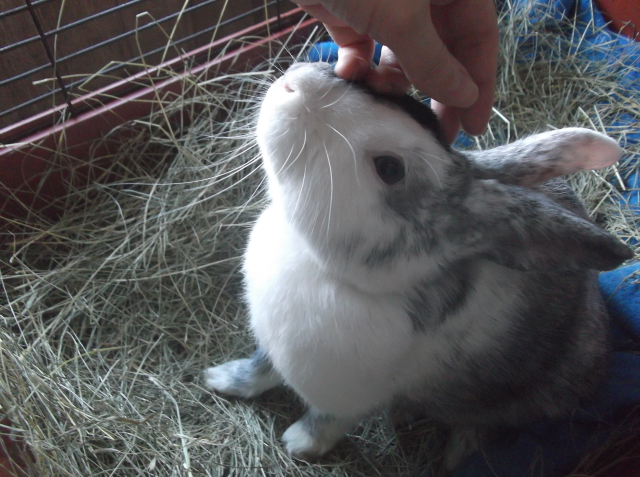 Adopted Outdoor House Rabbit, Quarantine?
QuestionQUESTION: We adopted a rabbit today, whod been
Adopted Outdoor House Rabbit, Quarantine?
QuestionQUESTION: We adopted a rabbit today, whod been
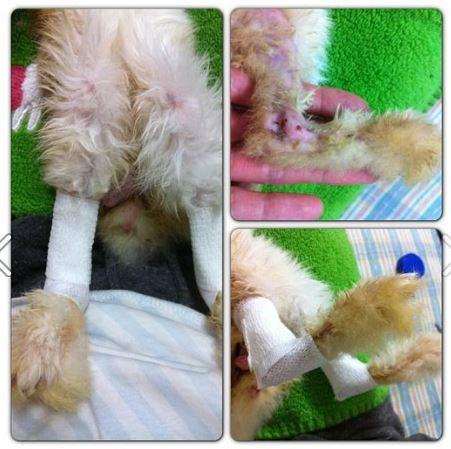 15 years old rabbit
Question
Oimo
Hi, I am asking for a japanese fri
15 years old rabbit
Question
Oimo
Hi, I am asking for a japanese fri
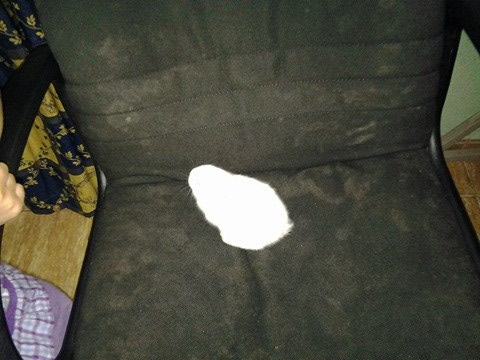 Answer Fast Please
QuestionFemale Rabbit
Female Rabbit
QUEST
Answer Fast Please
QuestionFemale Rabbit
Female Rabbit
QUEST
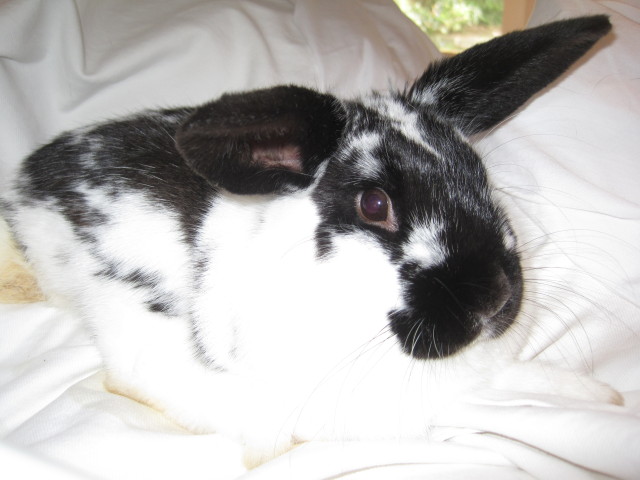 How do you know if a rabbit is ready to breed?
Question
my buck
Hi,
I have a black and white m
How do you know if a rabbit is ready to breed?
Question
my buck
Hi,
I have a black and white m
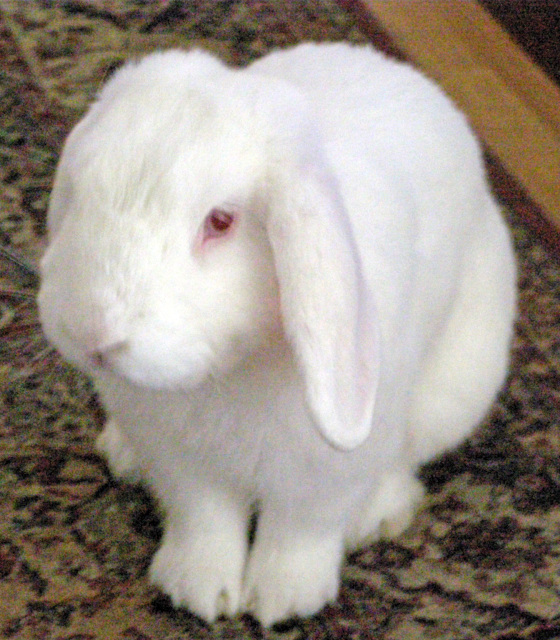 Male rabbit is spraying and pooping everyware
Question
Marshmellow
I have a male rabbit about 2 yrs o
Male rabbit is spraying and pooping everyware
Question
Marshmellow
I have a male rabbit about 2 yrs o